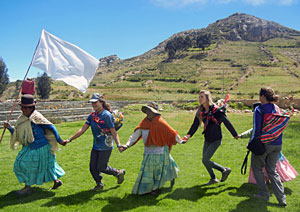A Psychology Major Abroad
November 18th, 2016 | SIT Study Abroad
Olivia Legan, Kenyon College

When I initially chose to go abroad with SIT on their program Multiculturalism, Globalization, and Social Change in Bolivia, I accepted that I would be putting my psychology major “on hold” in order to improve my Spanish and live in South America. In hindsight, this anticipated tradeoff is almost laughable because I cannot imagine an abroad program that could have contributed more to my psychology major. I have returned from Bolivia thinking critically about Western concepts of well-being and the puzzle that is global mental health. I now seek to understand how each culture divides or unites the mind, body, and spirit, and what happens when these clashing understandings of health converge.
I cannot imagine an abroad program that could have contributed more to my psychology major.
The program weaves psychology into a tapestry of history, gender, race, social justice, climate change, and globalization. All of these areas are explored not only through classes but through direct experience. The concepts I had studied for the past three years of college came alive as they were put into a context that felt massively important and global. We learned about collective trauma in the context of Bolivia’s military dictatorships, speaking with survivors of torture and also ex-ministers of the government. We explored liberation psychology as a response to neoliberal policies that have plagued Latin America and visited Cerro Rico, the silver mine that is known as the “birthplace of capitalism.” We learned about eco-psychology and the impact of climate change and globalization on cultural concepts of happiness and well-being, and we lived with indigenous families on Lake Titicaca and in the Amazon. Simply living in and navigating a rich culture so different from one’s own is vital for anyone studying human behavior. Being challenged to both expand on and deeply question my own belief system has made me not only a better person but a better psychology major as well.
The Independent Study Project (ISP) was what originally drew me to the program, but I did not know how important the experience would be. While I had worked as a research assistant before, the ISP allowed me to research my passion in a hands-on, empowering way. We were given freedom to plan and conduct a research project on nearly anything, nearly anywhere in Bolivia. Classes on research methods and ethics and Spanish for the social sciences equipped me with the skills to conduct my research, while our excursions to sites all over Bolivia informed my decision of where to go.
During the program, we explored the parallels between colonization and globalization, and I began questioning the concept of global mental health. I was curious if the dissemination of Western psychology acts as a modern colonizing force. This motivated me to do my Independent Study Project on the different cultural forces that shape Bolivia’s view and treatment of mental health. The program endlessly supported me throughout this process. I decided to live at a family-run rural alternative therapy center that drew on ancestral health beliefs. I then worked directly with patients with schizophrenia at an urban Catholic psychiatric hospital that employed Western and psychoanalytic methods of treatment. These two experiences, in addition to interviewing other health professionals and the process of writing my research paper, reshaped my view of mental health. Branching off from my close-knit, supportive program for a month was challenging, but the autonomy of the ISP experience allows for tremendous growth.
an abroad experience that truly challenges Western assumptions about human behavior prepares young people for the future of the field
The approach to psychology that SIT Bolivia takes prepares psychology majors for the future. Not just their own futures, but that of the field itself. For far too long, psychology has maintained the belief that Western health beliefs are “neutral,” while others are “culturally bound.” As the United States begins to appreciate its many cultures instead of tossing them into the melting pot, psychology as a field within the United States is (thankfully) changing. While it is vital that colleges internationalize and diversify their psychology curriculum, an abroad experience that truly challenges Western assumptions about human behavior prepares young people for the future of the field. The next generation of mental health workers must recognize and respect a wide variety of belief systems. Being a psychology major with SIT Bolivia gave a new weight and meaning to this part of my identity, equipping me with a mindset that is necessary not only to enter the field of psychology but to improve it.
